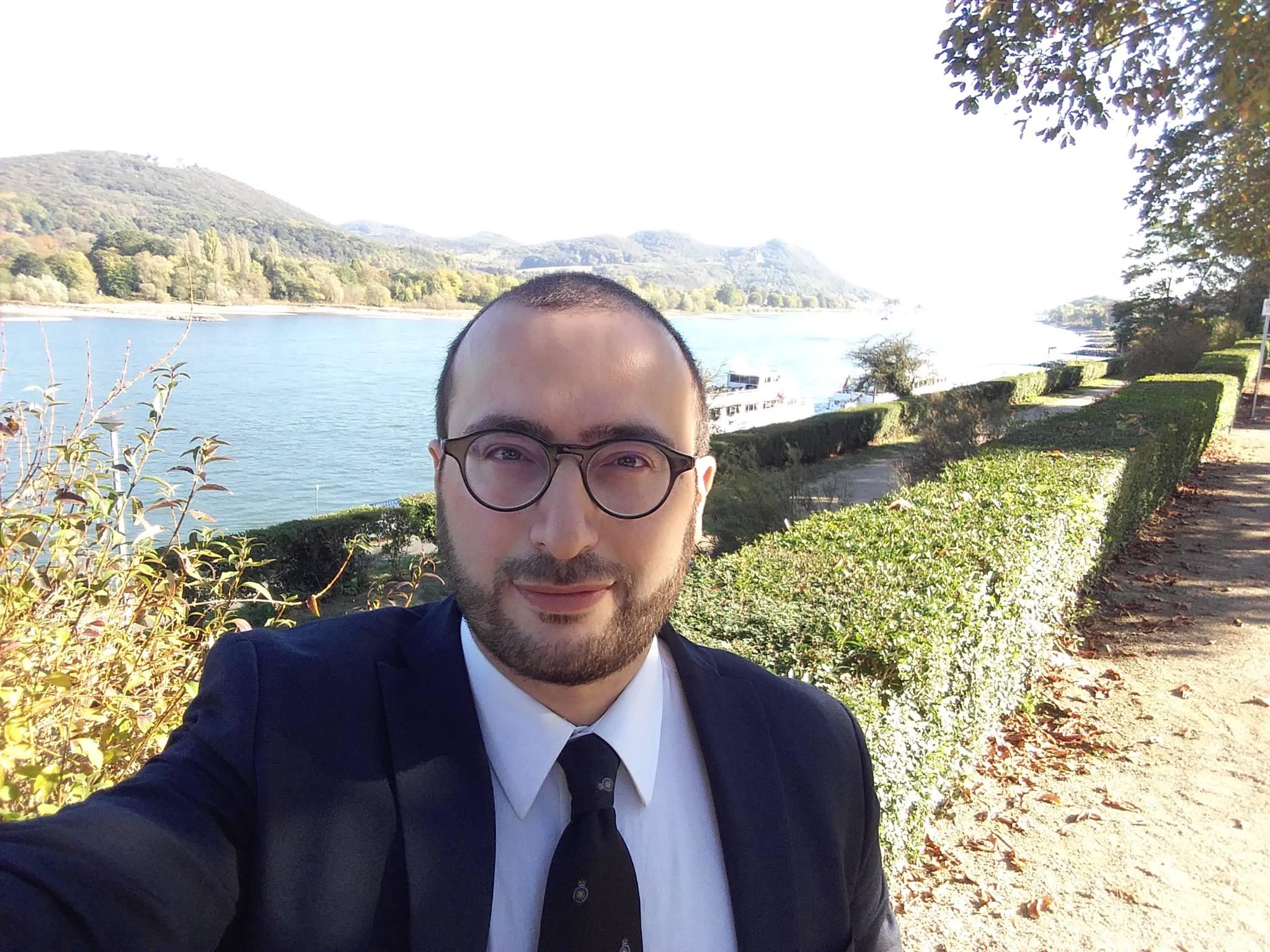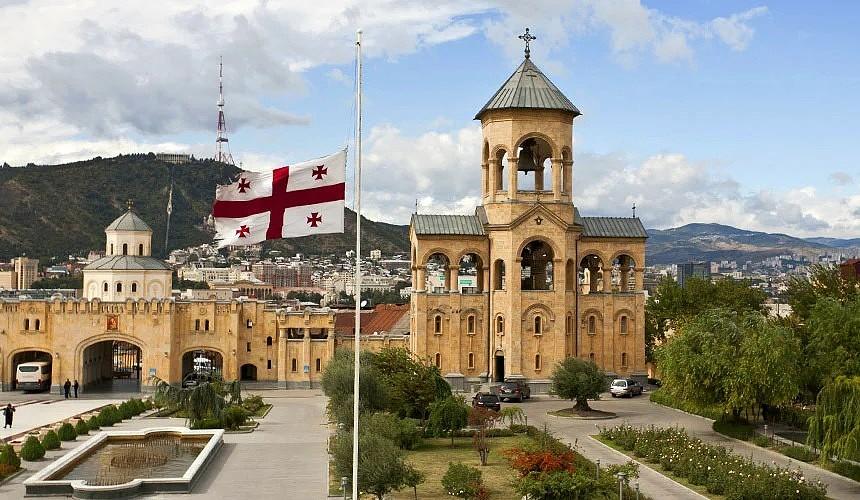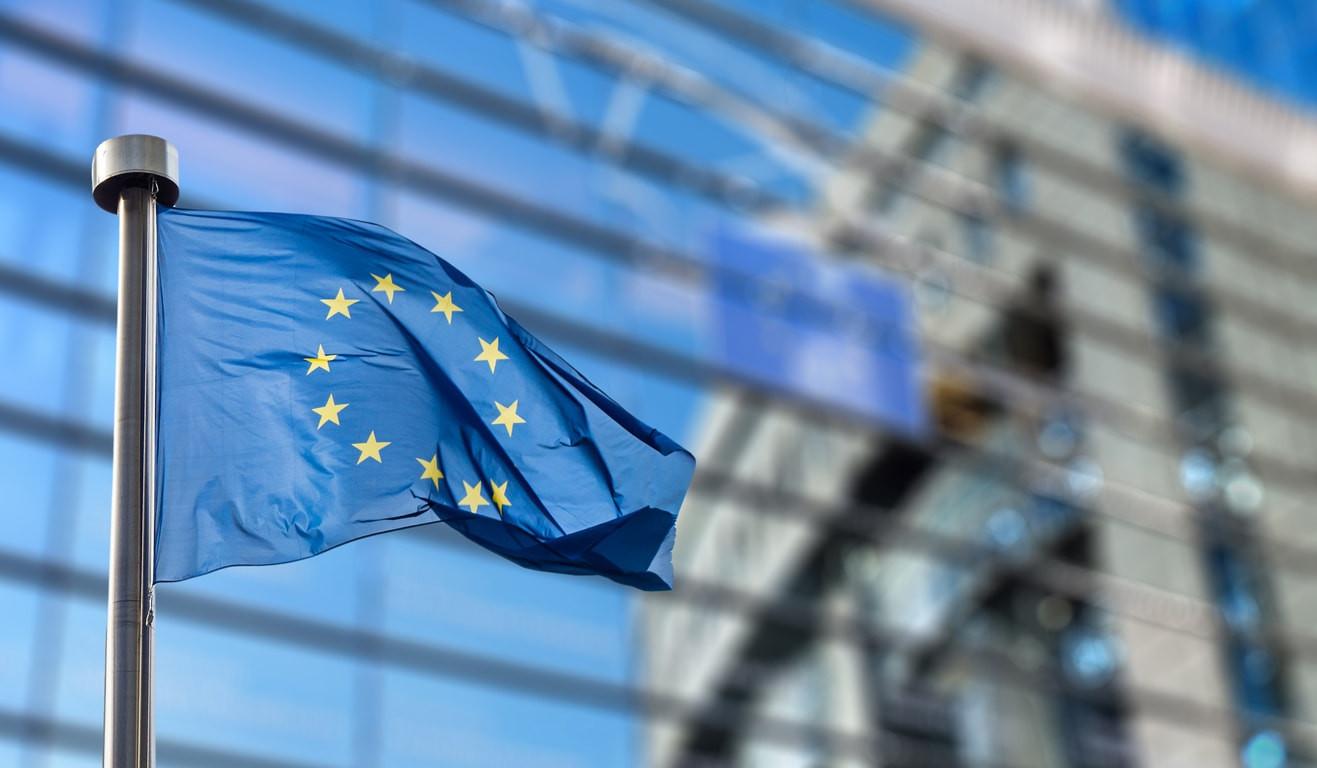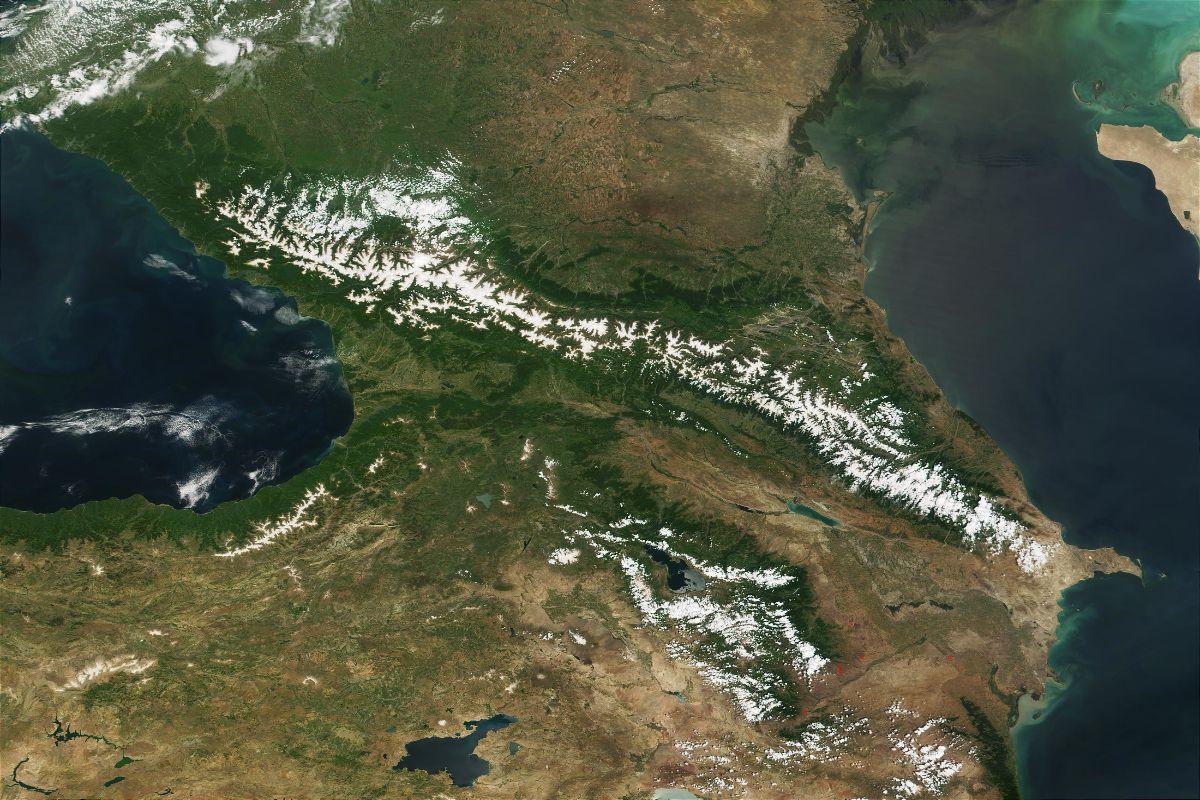“The EU should do more to develop cooperation between the countries of the South Caucasus”
Caliber.Az interview with an expert of Jena University
INTERVIEWS 12 May 2022 - 17:07
| Tamilla Mammadova Caliber.Az |
Caliber.Az’s interview with a Georgian expert on the foreign policy of the South Caucasus countries, a post-doctoral researcher at the Jena University named after Friedrich Schiller (Germany), Mikhail Sarjveladze.

- How far, in your opinion, has Georgia advanced on its way to joining the EU and NATO?
- Currently, we can observe how Russia's aggressive war against Ukraine speeds up the process of EU integration not only for Kyiv but also for Moldova and Georgia.
First Ukraine, and then Moldova, and Georgia received a questionnaire from the EU, which contains many simple and complex questions and should provide accurate information about the countries. Now there is more solidarity in the EU towards Ukraine than ever before. Other countries that also want to become part of the EU, getting benefit from the situation. Georgia, for example, initially planned to apply for EU membership in 2024 and obtain candidate status by 2030. Due to the changed situation, both Moldova and Georgia already applied for EU membership on March 3, 2022. Georgia submitted the first part of the questionnaire to the EU on May 2 and the second part - on May 10.
It is expected that the EU Commission will prepare an assessment based on the completed questionnaire in June, and submit it to the European Council (EC), which decides whether to offer a further step - the prospect of membership. If the applicant country does not meet the requirements sufficiently, the EC identifies specific reforms, which are a kind of key priorities that the reviewed country must work on to move forward in this process. Accordingly, in addition to a political decision, Georgia’s status for an EU candidacy is primarily related to the state of reforms in the country.
Regarding NATO-Georgia relations, the Substantial NATO-Georgia Package (SNGP) is the main tool for practical cooperation between Georgia and NATO. The package launched in 2014, aims to strengthen Georgia's defence capability in line with NATO standards and help the country prepare for membership in the Alliance. NATO has officially confirmed several times that Georgia meets all the standards at the level of practical cooperation to become a member of the bloc. Georgia announced its willingness to become a NATO member 20 years ago. In 2008, at the NATO summit in Bucharest, the country was promised membership in the Alliance, and since then it has constantly been appealing to the bloc. However, the promise has not yet been fulfilled, since this is a political decision by NATO members, and the “invisible veto” of Russia has significantly slowed down this process.
At present, NATO does not want to be involved in Russia's war against Ukraine in any way. So, I think it is more likely that the Alliance will increase its support for Georgia, but will keep the door for membership closed shortly.

- What other reforms does Georgia need to carry out to join these organizations?
- During his visit to Georgia in late April, NATO Special Representative for the South Caucasus and Central Asia Javier Colomina confirmed that the Alliance's door for Tbilisi remains open, but NATO members are concerned about the stalled reform process in Georgia. He mentioned judicial and electoral reforms and the security sector as the main tasks.
The EU also expresses similar concerns. In addition, there is political polarization in the country, fuelled by both the ruling party and the majority of the opposition. Even at this historic moment, when EU candidate status and the opportunities associated with it suddenly seem real, the Georgian political elite is unable to demonstrate unity. This only encourages nihilism among the population, the vast majority of which supports the country's membership in the EU and NATO. Political parties in Georgia are fundamentally deprived of responsibility to their electorate and are so strongly involved in the struggle for internal influence that there is no place left for the most important thing - the will of the electorate.
An assessment of the implementation of the EU-Georgia Association Agreement, prepared for the European Parliament in March 2022, notes that over the past two years, Georgia has seriously departed from basic democratic principles and key political commitments. According to Freedom House, over the past six years, Georgia's democracy rating has continued to deteriorate, reflecting the country's domestic political reality.
- What do you think, which EU countries will vote for and against the admission of Georgia into their ranks?
- The process of accession to the EU is a long and complex procedure, which cannot be accurately determined in advance in terms of duration. We can roughly divide this process into three stages: 1) When a country is ready, it becomes an official candidate country, 2) The candidate country moves into formal accession negotiations to meet the accession criteria, and 3) When the negotiations and accompanying reforms are completed by mutual satisfaction of the parties, the country has the opportunity to join the EU.
I cannot say which countries will be more or less sceptical. We saw in early March that the German chancellor said that he was against the accelerated accession of Ukraine to the EU. On April 9, French President Emmanuel Macron spoke of a process that could take decades. However, three countries (Ukraine, Moldova, Georgia) must be granted candidate status so that the integration process can gain a new impetus. Moreover, this would be a geopolitical statement on the part of the EU, which also has to act geopolitically to protect its interests. Russia's goal is to dismantle the European security architecture and share spheres of influence with NATO and the US. Russia's war against Ukraine is part of this plan, and therefore it is important that the EU act.
As we know from the past, it was not the intensification of relations that was mainly opposed by Germany or France, but the question of membership. At the same time, we are now facing a certain turning point, which is associated with a change in the role of Russia, for example, from Germany’s point of view. This turning point opens up new opportunities for countries wishing to integrate, such as Ukraine or Georgia.

- What does inspire Georgia to strengthen the pro-Western direction?
- At the EU level, the answer is simple, because it is one of the largest economies in the world. Moreover, unlike the Eurasian Economic Union, the EU is a community of values that, despite its complexity, is based on freedom, democracy, equality, the rule of law or human rights and is of great importance for democratic development.
Within the EU, Georgia currently has the best chance of preserving its independence and cultural identity, because if the country again fell under the Russian influence, Russification will be inevitable as in the past. Russia, with its neo-imperial ambitions, poses an existential threat to Georgia.
At the NATO level, the main concern is security. Georgia is the only country in the South Caucasus that is not a member of the security alliance and cannot rely on an ally, as Azerbaijan relies on Turkey. Therefore, for the security of Georgia, it is necessary to join NATO.
Georgia seeks not only membership in the EU and NATO. As a transit country, Georgia is a significant country for Western actors in terms of geostrategy. However, without security guarantees, Georgia could become easy prey for Russia if Moscow tries to compensate for its inevitable defeat in Ukraine. Therefore, Georgia obviously needs Western security guarantees.
- How do you assess the current foreign policy of the Georgian government?
- The current foreign policy of Georgia is impulsive, not strategically established, and driven by fear. Russia's war against Ukraine, which led to the world's great solidarity with the Ukrainian people, was marked by the passive position of the Georgian government, allegedly to avoid a new war against Georgia. However, as you know, Russia does not need additional reasons to attack the country. Russia sees not only Georgia, but also other states of the South Caucasus, as well as Moldova and Ukraine, as its sphere of influence. Moscow clearly outlined this goal in its draft agreements sent to NATO and the United States in December 2021. Without war or with war, Russia offers Georgia only limited sovereignty, which cannot meet the interests of the Georgian people and state.
Accordingly, Georgia needs to inform on which side Georgia is. Tbilisi must rely on Western actors to strengthen the containment of Russia and must be part of this process. Instead, Georgia did not join the sanctions against Russia and did not participate in the Ukrainian meeting of NATO countries and partners in Ramstein [a United States Air Force base in southwestern Germany], which demonstrated the mobilization of actors to create a kind of global military coalition to prevent further Russian aggression.
Georgia runs the risk of putting its reputation on the line as the West’s reliable partner in the region. The country pursued a foreign policy aimed at avoiding another war for many years. However, Russia continues to kidnap civilians from the occupation area and in some cases kill them, as well as shift the occupation area. What can Georgia confront in this process without a security alliance? Nothing! What will be the endgame? This should be an essential issue for the Georgian government without thinking that it can influence Russian foreign policy.

- What do you predict about the future of the Caucasus region?
- Prediction is a thankless job. However, several scenarios can be deduced from the new geopolitical realities after the Second Karabakh War. The end of the war was accompanied by two new developments: firstly, Russia deployed almost 2,000 soldiers [peacekeepers] on the territory of Azerbaijan, thus now its militaries are in all states of the South Caucasus.
Secondly, from Russia’s point of view, Turkiye, having changed the rules of the game, entered into the sphere of influence of Moscow, and expanded its position in the region. In addition, Azerbaijan, Turkiye, Russia, Iran, and Armenia established the 3+3 Consultation Platform in December 2021. The platform is an expression of the dynamics of regional restructuring in the South Caucasus as a result of the Second Karabakh War. This attempt at illiberal regionalism extends to Georgia, which has chosen not to participate in this format.
If the project is implemented, pressure on Georgia from regional players will increase. However, the weakening of Russia through the war with Ukraine may create scope for new processes. First of all, I attribute to them the possible rapprochement between Armenia and Azerbaijan, which, in turn, can normalize the Armenian-Turkish relations. The fact is that, the EU is now trying to present itself as a mediator, as it did in early April 2022 at the tripartite meeting of European Council President, Charles Michel, with President Ilham Aliyev and Prime Minister Nikol Pashinyan. This is the correct approach, but it is not enough. The EU should do more to develop cooperation between the countries of the South Caucasus and develop its own regional strategy, which would be an attractive alternative to, for example, the 3+3 format.
Caliber.Az
|
1
|
20 points. What did Armenia, the EU and the US agree on in Brussels? Sensational details on Caliber.Az
17 April 2024 - 11:01
|
|
2
|
Times: UK, Armenia hold talks on sending illegal migrants to Armenia
15 April 2024 - 10:00
|
|
3
|
"Historical" Armenia vs. present-day Armenia Unveiling the conundrum
15 April 2024 - 09:11
|
|
4
|
Caliber.Az to reveal sensational details of "Brussels meeting" Important announcement
16 April 2024 - 12:09
|
|
5
|
Iran seeks international backing following missile strikes on Israel Raisi calls Russia & Qatari leaders amid tension
17 April 2024 - 16:56
|
At Chinese trade fair, exporters despair their goods - "as cheap as cabbage"
18 April 2024 - 05:04
Europe restarts magnesium mining to counter reliance on China
18 April 2024 - 03:05
Lithuania, Rheinmetall sign agreement for 155mm ammunition plant
18 April 2024 - 01:03
Want to move to Europe?
17 April 2024 - 23:00
IDF strikes Hezbollah military facilities in Lebanon
17 April 2024 - 21:18
Georgian PM accuses country’s President of being an “agent of foreign influence”
In rebuke on transparency bill17 April 2024 - 21:15
Azerbaijan to showcase climate change adaptation at COP29
FAO official says17 April 2024 - 21:10
Swiss parliament wants ban on extremist symbols
17 April 2024 - 20:58
Protest rally against foreign agents bill resumes in Tbilisi
17 April 2024 - 20:50
UK urges European countries to increase defence spending
17 April 2024 - 20:45
AZAL, DFS aviation services forge key partnership to equip Lachin airport
17 April 2024 - 20:33
Turkish FM, Hamas leader discuss Gaza aid, cease-fire
17 April 2024 - 20:20
Russian peacekeepers' mission in Karabakh accomplished
Member of State Duma says17 April 2024 - 20:08
Tackling 10 prejudices about hydrogen following Clean Transition Dialogues
17 April 2024 - 20:00
Azerbaijani Ombudswoman raises mine issue in liberated territories at meeting with UNDP rep
17 April 2024 - 19:53
Azerbaijan, Tatarstan forge stronger ties across trade, innovation, humanitarian endeavors
17 April 2024 - 19:40
Azerbaijani FM, CICMA executive director engage on chairmanship priorities & collaboration
17 April 2024 - 19:32
Azerbaijan plans Europe-bound exports of green hydrogen made in "recently liberated territories"
Article by Hydrogen Insight17 April 2024 - 19:28
UK PM Sunak plans to create "smoke-free generation" with tough measures on tobacco
17 April 2024 - 19:13
Azerbaijan and Albania announce visa-free regime
Legislative progress underway17 April 2024 - 18:59
Azerbaijan, Tatarstan discuss developmental directions of economic partnership
17 April 2024 - 18:46
OSCE Chair-in-Office due in Azerbaijan
17 April 2024 - 18:30
Armenia's economy lacks development
Expert highlights concerns17 April 2024 - 18:15
Azerbaijan's Air Force, Air Defence Forces conduct tactical exercises in Nakhchivan
Video, Photo footage from drills17 April 2024 - 18:01
UN continues support for Azerbaijan's demining efforts in Karabakh region
17 April 2024 - 17:48
Azerbaijani president designates Shusha as 2024 Youth Capital of OIC
Action plan underway17 April 2024 - 17:35
Czech Republic collects 500,000 shells for Ukraine
17 April 2024 - 17:23
President: Iran’s operation shatters Israeli military’s invincibility myth
17 April 2024 - 17:10
Iran seeks international backing following missile strikes on Israel
Raisi calls Russia & Qatari leaders amid tension17 April 2024 - 16:56
Georgian parliament approves draft law on foreign agents
17 April 2024 - 16:41
Azerbaijan, Israel discuss energy cooperation
17 April 2024 - 16:27
Is Ukraine on the edge?
Big vulnerabilities17 April 2024 - 16:13
Azerbaijan, Pakistan discuss defence cooperation
17 April 2024 - 15:59
United States enhances support for Armenia
17 April 2024 - 15:45
EU interested in Azerbaijan's development of Middle Corridor
PHOTO17 April 2024 - 15:31
President Aliyev, Kairat Sarybay discuss COP29, green transport concept
17 April 2024 - 15:27
President’s aide confirms Russian peacekeepers’ withdrawal from Azerbaijan
The process has already started!17 April 2024 - 15:19
French ambassador recalled from Azerbaijan amidst bilateral strain
Macron admits defeat17 April 2024 - 15:19
Hereditary Azerbaijanophobe in Armenia and his provocations
17 April 2024 - 15:04
US, Iraq discuss Iraq-Türkiye oil pipeline
17 April 2024 - 14:50
